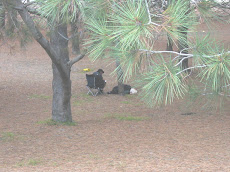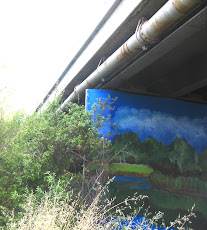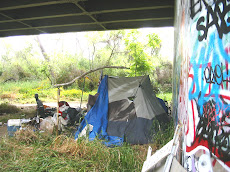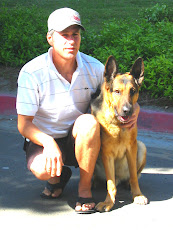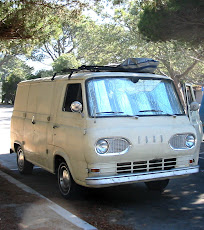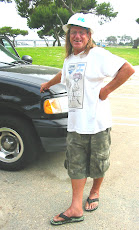
The wind is blusterous and cold, blowing palm trees, my hair, everything, straight out like windsocks, all pointing east. It is spring, but it feels colder than winter, as spring often does. Wacky weather and strange things tend to happen this time of year.
Sheila visited me while I was doing my toilet yesterday. She bustled into the ladies room like she always does, throwing her arms around me. "There you are! I've been looking everywhere for you! Where've you been?"
"I've been here."
"No you haven't. I've been looking everywhere for you. Where've you been?"
"Sheila, I have been here. I am always here. I always sleep out here."
"No-o-o-o." Sheila drew out the o so that no sounded more like new. "Where were you?"
Sheila does not believe the truth, so I pondered telling a grand lie before choosing the best strategy: I stop responding to the questions. I had to brush my teeth and gargle, anyway, which gave her the chance to tell me she was high.
The occasion was that her boyfriend, Brian, went to jail. Brian is a big man, cheerful, funny, loving. Except when he is drunk, and then he hits people who are not showing him the love back. Sheila is a cute, small-built blonde who likes to have fun. Otherwise, she is depressed and gets angry for no apparent reason. She can make one up.
Sheila was feeling lonely. She mentioned the wedding she and Brian were planning. "Yeah," I said, "if he doesn't kill somebody and go to prison." Now that might have been a joke were it not Brian we were discussing. Sheila suggested I get in her car, and we could drive around, find something to do. I begged out. I had a long list of chores for my day off.
Why alcoholics imagine anyone wants to ride in a car with them puzzles me. Sheila and Brian would usually offer to take me somewhere with them while they were not only drunk, but arguing. But that was last summer, when I was new to homelessness. Still, I am not one to risk my life for friendship.
I grew fond of Sheila and Brian. They were close to normal, except for the drinking. She drove a new Audi and wore nice clothing. So did Brian. They were both used to working and having money. I drove into the parking lot next to the restroom one summer day and happened to take the parking space next to theirs. They had the windows down in the Audi, the better to enjoy the fresh air off the Bay.
They spoke to me and introduced themselves, finally getting around to asking if I were homeless. They had seen me around the washroom at the Yacht Club. It was my first close encounter with other homeless people, and it went a long way to easing the estrangement I felt. To this day, I am grateful for Sheila and Brian's presence in my life then. Sheila finally received a long-awaited settlement from a former employer and went on to find a house to rent.
"Why are you doing this to yourself?" Sheila's words encompassed the space we were standing in and were meant to ding every corner of my life, with which, fortunate for me, she had no familiarity. Still, I did not want to hear aspersions cast on my truck, my favorite washroom, the Yacht Club parking lot.
"Look at me . . . I have a place to live! If I can do it, you can do it!" Sheila meant well with the motivational, strong talk.
Finished gargling, I turned to speak to Sheila. I had planned to change the subject, but she wasn't there. I looked around, stepped out of the washroom. Her car was gone. That is the way of many people I have met who are, or have been, homeless. Here. Gone.
I can't say when I might see Sheila again. The same with Bob, for example. If I look for him, I can't find him. He finds me. The day before Sheila's appearance, I was just getting out of my truck to do my morning ritual when Bob showed up on his bicycle.
"Hey, Bob! Where's the truck?"
"Oh, they took my truck," he said slowly, resigned, with his usual composure. Having one's vehicle taken is quite serious for the homeless. It takes homelessness to a deeper, lower level. It means sleeping outdoors and makes the logistics for working and making money next to impossible. It spells the end of life as we know it.
"Whaaat?!"
"I got a DUI."
"Oh." I was let down. I was ready to defend Bob, but there is no defending anyone who is a serious risk to others. Still, it was odd because, while Bob certainly drinks, he does not drink and drive. He knows better.
"Where are you sleeping?"
Bob must have told me where he was sleeping, but I didn't quite hear it. The idea of Bob sleeping outdoors made me feel sad, and my mind was fogging over.
"How are you staying warm?"
"Oh, I'm warm enough. I have a blanket . . ." Bob's voice trailed off in my mind. I had stopped listening. I had nowhere to go with what Bob was telling me. Losing the truck would mean he was over the edge. No way up from there.
"Oh, I went to the doctor, too," Bob said in his offhand style. "I have cancer."
Bob went on, but we might as well have been under water. He pulled a paper out of his jacket and handed it to me --- a medical report with a short, intimidating list: leukemia, hepatitis, impaired immune system.
Bob also had a doctor's Rx that prescribed a daily bath and staying away from shelters to minimize exposure to cold or flu. Some half-buried part of me, now lying on the bottom of the Bay, wanted to scream with laughter about the daily bath. I wondered how this doctor imagined Bob would do that, and I wanted to tease Bob about it; but I could not resurrect my humor.
I felt very tired all of a sudden and turned the topic to lighten things up.
"It's a good thing you had your bike."
"Oh, you haven't seen this one. This one's new." Bob paused here. "I stole it."
Bob doesn't steal, either, so the bike was a matter of conscience for him. "I can't handle a bike now without a lot of gears. I get too tired. This is a $700 bike. I figure if the guy can afford this, he can afford another one."
I offered some forgiveness, which I knew Bob would appreciate.
"I'll send up a prayer for the person whose bike you took, Bob. Maybe he didn't even miss it. Maybe he forgot he had a bike like that."
"Yeah . . . well, I needed it."
The conversation dwindled to a chat, and I excused myself for work.
The wind was cold and carrying sand. There were high clouds skittering overhead. I sat back and started up the truck. Driving along South Shores, the view is a lonely desert, palms trees here and there. I thought, and quite a departure from the past few days, what a silly word, daffodil. Once upon a time, a girl might be named Lily, Iris, Rose, Daisy, but never Daffodil. The Elizabethans called the flower, daffodilly or daffodowndill. Sometimes primrose peereless.
I could imagine being a Primrose Peereless, a new companion to Avenger, Jonathan Steed, off to save the world from diabolical schemers.
A scene came to mind just then. As a child, I had often seen daffodils sprung up from the frosty ground, sometimes in snow. They were always in bloom at Easter, and along the trip to church, both sides of the road would be strewn with their bobbing, bright, yellow heads, the only sunshine amid a gray and white landscape.
The magical, numinous sight of the daffodils of my memory lifted my heart. That silly word alone was a relief. There are so many questions for which I have no answers. I am coming to think there are no questions: just things that happen. In place of answers, this time, I found wonder.





